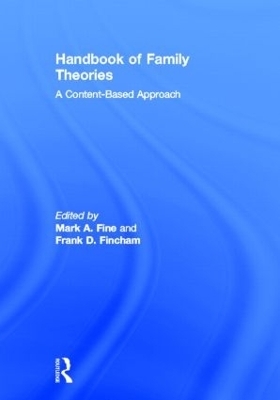
Handbook of Family Theories
Routledge (Verlag)
978-0-415-87945-3 (ISBN)
The introductory chapter, written by the editors, provides an overview of the role family theories have had on the field. This chapter is followed by 23 others on family-related content areas written by renowned scholars in the field. The book is organized around the most important domains in the field: parenting and parent-child relationships, romantic relationships, conflict and aggression, structural variation and transitions, demographic variations, and families and extra-familial institutions. Each of the contributors describes how theory has been used to generate new knowledge in the field and suggests future directions for how theory may be used to extend our knowledge base. The book helps readers acquire a working knowledge of the key family science theories, findings, and issues and understand how researchers make use of these theories in their empirical efforts.
To maximize accessibility, each of the renowned contributors addresses a common set of issues in their chapter:
• Introduction to the content area
• Review of the key topics, issues, and findings
• A description of each of the major theories used to study that particular content area
• Limitations of the theories
• Suggestions for better use of the theories and/or new theoretical advances
• Conclusions about future theoretical developments.
An ideal text for graduate and/or advanced undergraduate family theories courses, this book’s unique organization also lends itself to use in content-based family studies/science courses taught in family studies, human development, psychology, sociology, communication, education, and nursing. Due to its comprehensive and current approach, the book also appeals to scholars and researchers in these areas.
Mark A. Fine received a PhD from the Ohio State University in Clinical Psychology and is currently Professor and Chair of the Department of Human Development and Family Studies at The University of North Carolina at Greensboro. He was editor of Family Relations from 1993 to 1996 and the Journal of Social and Personal Relationships from 1999 to 2004. He has published almost 200 peer-reviewed journal articles and book chapters, as well as nine books. In 2000, he was selected as a fellow of the National Council on Family Relations. He is on the editorial boards of nine peer-review journals in family studies, relationship science, and human development. Frank D. Fincham obtained a doctoral degree in Social Psychology as a Rhodes Scholar at Oxford University and then completed postdoctoral training in clinical psychology at Stony Brook University. He is currently Eminent Scholar and Director of the Family Institute at Florida State University. The author of more than 200 publications, his research has been widely recognized by numerous awards, including the Berscheid-Hatfield Award for “sustained, substantial, and distinguished contributions to the field of personal relationships” from the International Network on Personal Relationships and the President’s Award for "distinguished contributions to psychological knowledge" from the British Psychological Society. A Fellow of five different professional societies, Frank has been listed among the top 25 psychologists in the world in terms of impact (defined as number of citations per paper).
M. A. Fine, F. D. Fincham, The Role of Theory in Family Science. Parenting and Parent-Child Relations.A. Smith Leavell, C. S. Tamis LeMonda, Parenting in Infancy and Early Childhood: A Focus on Gender Socialization. M. A. Longmore, W. D. Manning, P. C. Giordano, Parent-Child Relationships in Adolescence. J. S. Bates, A. C. Taylor, Taking Stock of Theory in Grandparent Studies. K. S. Birditt, K. L. Fingerman, Parent-Child and Intergenerational Relationships in Adulthood. M. E. Lamb, The Changing Faces of Fatherhood and Father-Child Relationships: From Fatherhood as Status to Father as Dad. Romantic Relationships: Dating, Cohabiting, and Marital. C. L. Cohan, The Cohabitation Conundrum. K. Allen, L. M. Diamond, Same-Sex Relationships. B. R. Baucom, D. C. Atkins, Understanding Marital Distress: Polarization Processes. Conflict and Aggression in Families. D. E. Saxbe, A. J. Rodriguez, G. Margolin, Understanding Conflict in Families. R. E. Heyman, H. M. Foran, J. L. Wilkinson, Theories of Intimate Partner Violence. T. Del Vecchio, A. C. Eckardt-Erlanger, A. M. Smith-Slep, Theories of Child Abuse. J. Grych, C. Oxtoby, M. Lynn, Effects of Interparental Conflict on Children. Structural Variations and Transitions in Families. J. D. Shannon, L. Baumwell, C. Tamis LeMonda, Transition to Parenting Within Context. D. H. Demo, C. Buehler, Theoretical Approaches to Studying Divorce. A. C. Taylor, M. Robila, B. Fisackerly, Theory Use in Stepfamily Research. Demographic Variations in Families.J. T. Wood, Becoming Gendered: Theories of Gender and Families. S. S. Chuang, R. P. Moreno, Theoretical Perspectives on Acculturation and Immigration. M. B. Donnellan, M. J. Martin, K. J. Conger, R. D. Conger, Economic Distress and Poverty in Families. T. M. Cooney, P. A. Dykstra, Theories of Intergenerational Family Relationships in Adulthood. Families and Extrafamilial Institutions.M. Perry-Jenkins, S. M. MacDermid, The State of Theory in Work and Family Research at the Turn of the 21st Century. B. H. Fiese, A. Hammons, Theories of Family Health: An Integrative Perspective and Look Towards the Future. G. L. Bowen, J. A. Martin, J. A. Mancini, The Resilience of Military Families: Theoretical Perspectives. C. Regalia, C. Manzi, E. Scabini, Individuation and Differentiation in Families Across Cultures.
| Erscheint lt. Verlag | 8.2.2013 |
|---|---|
| Zusatzinfo | 1 Tables, black and white; 8 Line drawings, black and white; 8 Illustrations, black and white |
| Verlagsort | London |
| Sprache | englisch |
| Maße | 178 x 254 mm |
| Gewicht | 1065 g |
| Themenwelt | Geisteswissenschaften ► Psychologie ► Allgemeine Psychologie |
| Geisteswissenschaften ► Psychologie ► Entwicklungspsychologie | |
| Geisteswissenschaften ► Psychologie ► Familien- / Systemische Therapie | |
| Medizin / Pharmazie ► Medizinische Fachgebiete ► Psychiatrie / Psychotherapie | |
| ISBN-10 | 0-415-87945-0 / 0415879450 |
| ISBN-13 | 978-0-415-87945-3 / 9780415879453 |
| Zustand | Neuware |
| Haben Sie eine Frage zum Produkt? |
aus dem Bereich


